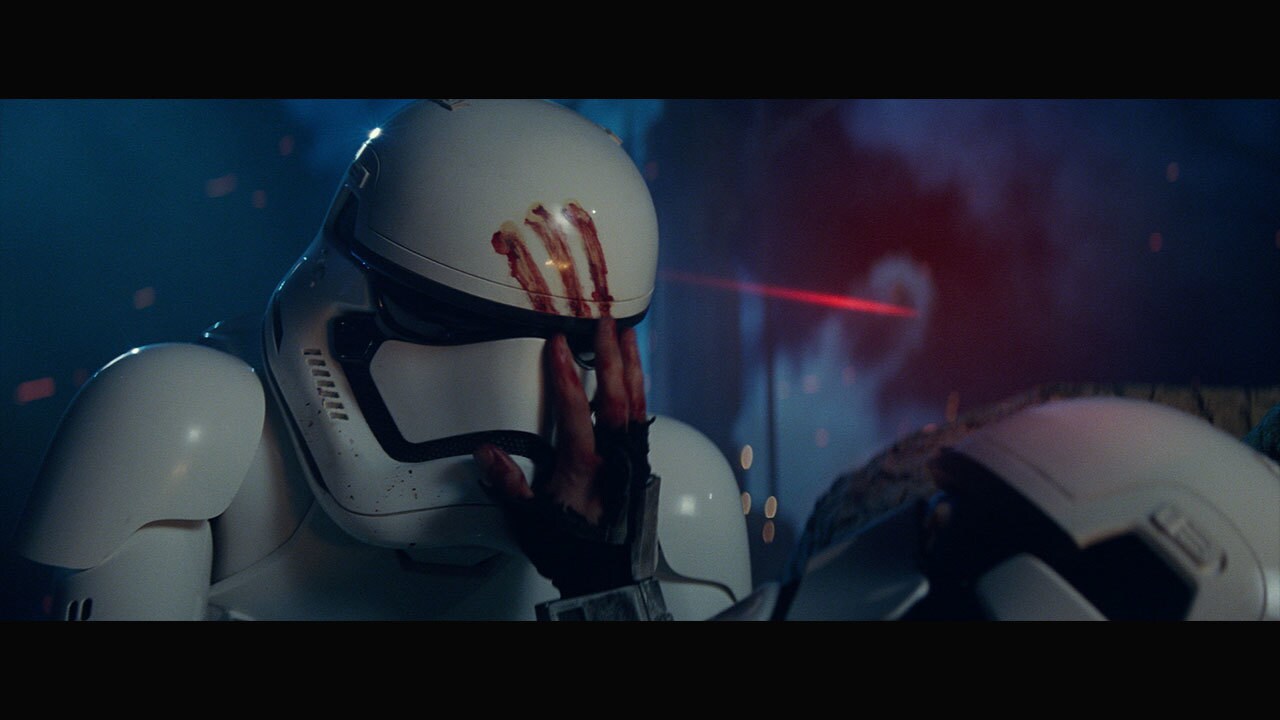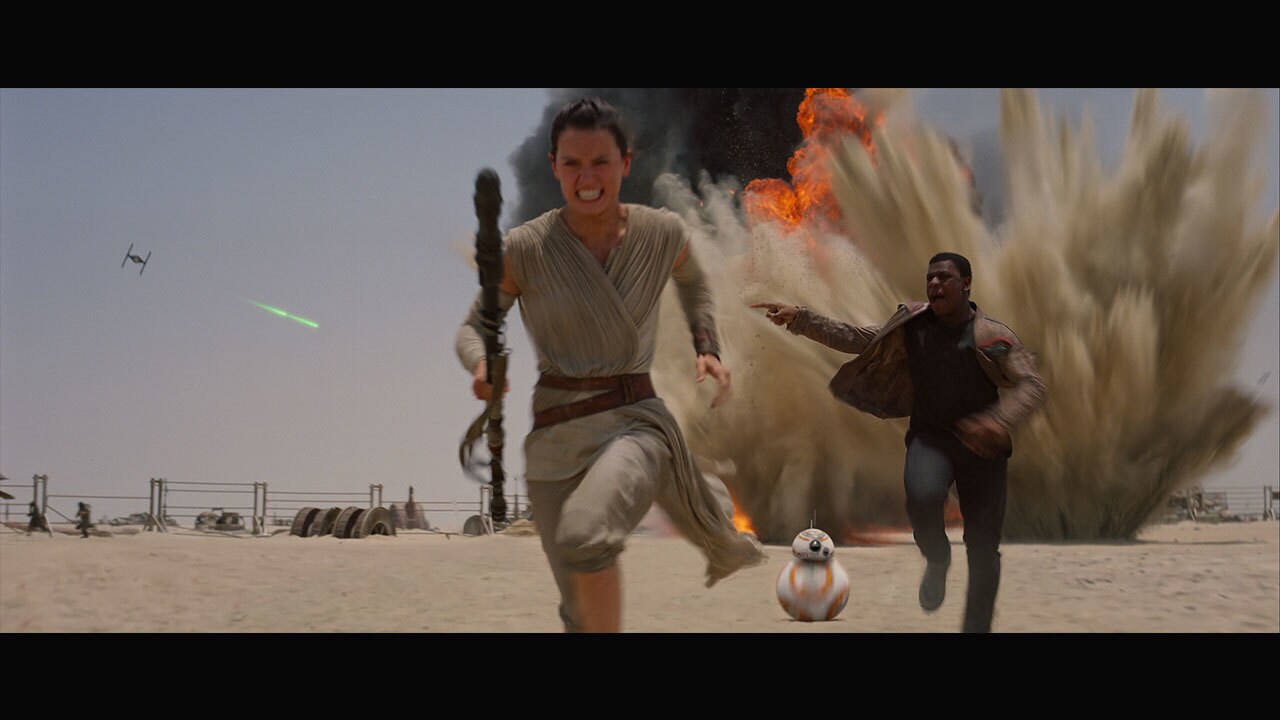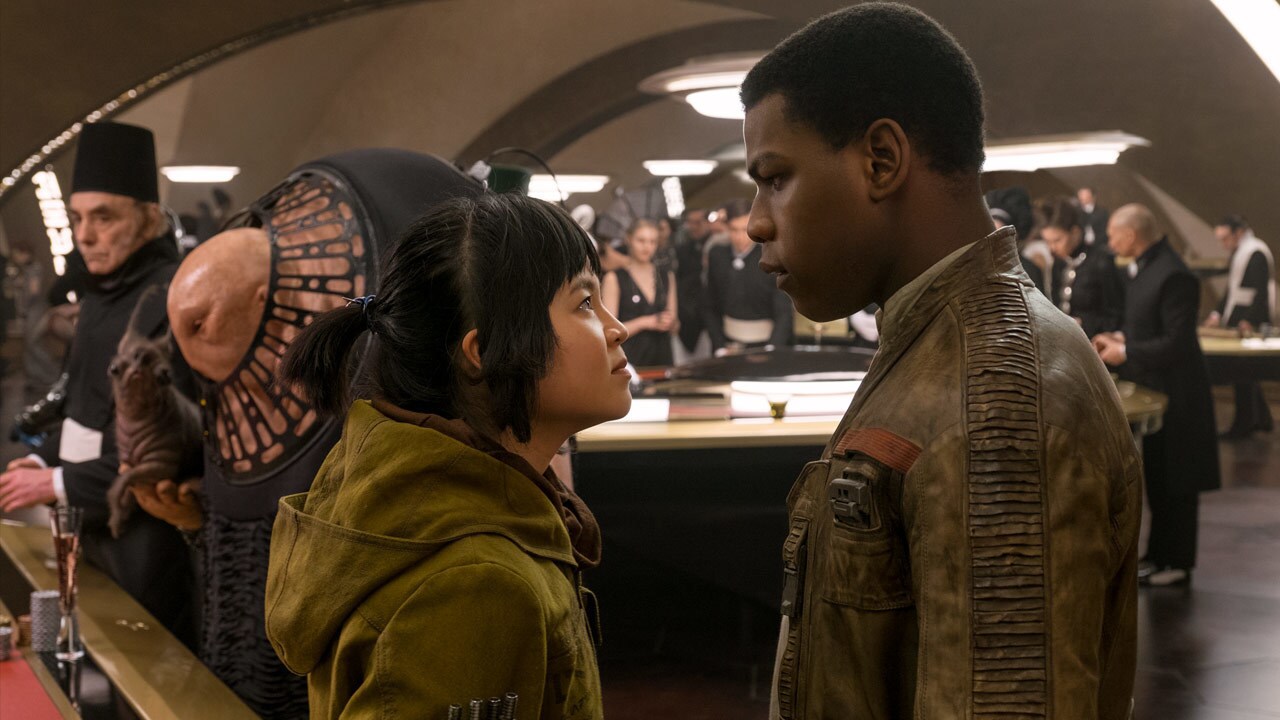Individual Agency Amongst the Military Ranks
In 1949, George Orwell published his dystopian novel, 1984 in which he imagined a future where a global surveillance system was used to monitor and control citizens. Independent thinking was censored and holding unorthodox or controversial thoughts that opposed or questioned those in power was considered a criminal act. In Star Wars this is exactly how the imperialistic First Order operates. Much like the Empire before it, the First Order uses fear to control the galaxy.
Yet this fiction is neither a long time ago nor in a galaxy far, far away. In fact, some would argue that such a dystopian future has become present in today’s America. In 2013, Edward Snowden, a contractor for the National Security Agency (NSA), leaked legitimate documents to the press describing how the NSA and Central Intelligence Agency (CIA) were spying on thousands of innocent American citizens without probable cause.
Edward Snowden was labeled a traitor by the US government. As an NSA contractor, he witnessed the development of surveillance software being used against the American public. In June of 2013, Snowden decided to copy and reveal thousands of classified NSA documents to the press. He was charged with two counts of violation of the espionage act of 1917 and theft of government property. Snowden has been ostracized by the US government and the intelligence community, and currently lives in asylum in Russia. However, there is a large majority of people that consider him a hero because of his selfless act of exposing the government.
Similarly, in The Force Awakens, we meet FN-2187, a stormtrooper who was abducted at birth and forced to fight for the First Order. We see him gain some individual agency after a brief skirmish in Jakku that ultimately leads him to join the resistance against the First Order. Though Finn is called a traitor by a fellow stormtrooper in The Force Awakens, Rose Tico recognizes him as a hero of the Resistance in The Last Jedi. Like Snowden, labeling Finn as a hero or traitor depends largely upon the perspective of the person doing the labeling.
This project aims to dissect the reasons why Finn goes from being a faceless stormtrooper to a hero of the resistance as well as Snowden’s motives for leaking NSA documents. It is important to understand that unlike Finn, Snowden is not a defector, but a whistleblower, and although his moral compass doesn’t lead him to join a rebel army and fight with a blaster like Finn, his motives for exposing the American government are strangely similar to Finn’s reasons for defection from the First Order.

People who are familiar with the new Star Wars movies agree that Finn is a hero of the Resistance, taking in consideration that most viewers are biased towards the Resistance. Finn’s actions certainly portray him as a heroic character. From early on he is known as FN-2187, a byproduct of the First Order’s task to train soldiers since birth. After the First Order’s raid on Jakku that led FN-2187 to have a change in his conscience, he decides to defect from the First Order and try his own luck in the outer rim of the galaxy. Since he lacked pilot training he first mustered the courage to free Resistance pilot Poe Dameron who was being held by the First Order. When Poe asks FN-2187 why is he helping him he simply replies “because it is the right thing to do” (19:58), right before he agrees that he also lacks the pilot training in order to leave the First Order.
How and why they meet is extremely important to the development of our hero. For it is via his interaction with Poe that FN-2187 loses his facelessness and becomes Finn, a new identity of which he seems both willing and proud to embrace. Right after Poe and our newly named hero are shot down and crash into the desert of Jakku. Soon afterward Finn fortuitously meets Rey and Poe’s Astromech BB-8. Stalked by the First Order, Finn impersonates a Resistance fighter in order to gain their help escaping Jakku. The massacre on Jakku clearly influenced Finn’s decision to escape the First Order. Furthermore, although he has some signs of an awakened conscience and starts to act less like a faceless stormtrooper, his motives for defection are clearly self-seeking, in that he wants to get as far as possible from the First Order.

After eluding the First Order they arrive at Tokadana, where they meet Moz. It is here that Finn is faced with a choice to leave Rey and make it to the outer rim or deliver BB-8 to the Resistance. He chooses to leave Rey. When confronted by Moz she says that she sees the eyes of someone that wants to run; to which he replies emphatically that she doesn’t know where he’s from or what he has seen. Pivotal to the development of his individual agency this trait starts to solidify his individual agency and getting farther and farther from the faceless stormtrooper that he was. In the following scene, we see that Finn also comes clean to Rey about who he really is, it really speaks volumes of his individual agency when he swears the First Order forever, and how much he is not a faceless stormtrooper. However, he still chooses to leave.
It is right after he makes that decision to leave Rey that the First Order attacks Tokadana. The First Order ends up taking Rey hostage and Finn is compelled to rescue her. One could argue that his new more human identity makes him embrace the most of humanity, he literally comes back for the sole purpose of asking about Rey, not to mention he develops a plan and sneaks into Killer Base in order to save her. His new identity leads him to care about others rather than just himself. Finn’s selflessness is reflected visually on-screen as he holds Luke’s lightsaber for the first time–a symbol of justice. It is telling, too, that agents of the First Order begin to label him a traitor: first by the baton-wielding stormtrooper and later on Star Killer Base by Kylo Ren.
Finn’s development as a rebel continues into episode 8, The Last Jedi. The first scene we see get to see Finn is when he’s unconscious getting medical treatment back in the resistance ship. As soon as he wakes up his first word is “REY!” We clearly see that after the fight with Kylo Ren, Finn has transitioned from having selfish motives for his defection to a more selfless reason.
Later when he senses the danger that the First Order is right behind them, he uses Rey as a reason to defect again; this time to take the homing beacon away in an escape pod from the Resistance ship. It is important to notice that at this time his reason is solely to make sure to take the homing beacon away in order for Rey not to be captured by the First Order.
Finn is then stopped by Rose and the two develop a plan to disable the tracker onboard Snokes ship. Here we see Finn actually taking the initiative, and we see him moving away from the idea of just being about Rey and decides to go on a covert operation to find a codebreaker in Canto Bight in order to save the entire fleet. We see Finn transition from using Rey as a motive to run away in order to save her; to actually becoming a leader and taking a leadership role in the process.

Rose and Finn fail at their mission onboard the Supremacy and ore ordered to be executed by General Hux. It is at that moment that General Holdo jumps to lightspeed and crashes against the entire First Order fleet. Finn wakes up to a chaotic ship on fire looking to scramble into an escape pod with Rose. He is stopped and faced by Captain Phasma, who calls him traitor once more before the two engage in close combat.
Here we see Finn completely solidify his identity as a rebel and completely accepting who he is before knocking Phasma into an abyss of fire. Phasma states that he is scum. To which Finn replies “Rebel Scum.” This is the pinnacle of his individual agency to know that he is no longer a faceless stormtrooper but Finn a hero of the resistance, as Rose calls him.
With his individual agency at peak, Finn realizes that he can no longer sit on the sidelines and keep fighting for Rey, so he joins the Resistance on Crait for their last stand against the First Order. It is then that he gives us his final act of individuality when he personally sacrifices his own life in order to take out the battering-ram cannon on his own and stating that he won’t let them win. It is this level of ultimate selfless sacrifice that solidifies his identity in who he really is, a selfless character that is willing to fight for what is right in order for the resistance to triumph over the imperialistic project of the First Order.
Snowden’s reasons for leaking the documents are similar to Finn’s as in they both witnessed an injustice done by the entities they served. Leaking classified documents to the press was a selfless act that required a lot of courage, much like Finn exerted on Crait. The US government charged Snowden on two counts of violation of the Espionage act of 1917. By doing this the US government is indirectly labeling Snowden a traitor, just like the First Order does with Finn. The US government, much like the First Order, demonizes both characters as a tool in order to justify the prosecution of both characters, even though they themselves have committed more heinous crimes.
One of the things we gain from studying this parallel is a different perspective than the one given to us by the US government. A lot of people outside of the intelligence community consider Snowden a hero, because of his selfless act in exposing the government, much like Finn. Their reasons for showing individual agency are rooted in that they both witnessed horrible crimes and atrocities committed by the entities they served. One could really see that their motives are legitimate, both for Finn and Snowden. We clearly see Finn go through a journey of discovering himself and who he is, and we can assume that there were moments in Snowden’s career that led him to that day on July 2013 when he decided to leak the documents tot eh press. The ultimate face they both choose to show us is that of a hero who is willing to stand against an oppressor.
This acts of individual bravery lead Finn and Snowden to be considered traitors to the First order and the US Government in a couple of instances. One, by showing acts of outrageous courage in order to head directly into the battering-ram canon and leaking the document to the press. Second, by becoming iconic idols to the public and be considered heroes that the public can actually recognize their valor and courage and be acknowledged as individuals and not as parts of the militarized industrial complex.
The Empire and the US government are entities that to a certain degree defaces humans in order to serve to serve their purpose of either eradicating the Resistance or spying on their citizens. Ultimately we see our heroes gain an individual agency and show themselves as who they are as humans who care for others outside of the imperialistic entities they served. This level of individual agency sent both our characters to completely different paths that they were supposed to follow; that no matter how good or comfortable the job might be as an analyst or stormtrooper, they would much rather live in exile amongst or amongst rebels.
Work Cited
Star Wars Episode VII: The Force Awakens. Directed by J.J. Abrams, Lucasfilm, 2015.
Star Wars Episode VIII: The Last Jedi. Directed by Rian Johnson, Lucasfilm, 2017.
Thoughtcrime. Directed by Bernd Riemann, 2017.

In his essay, Luis Arguello explores the topic of individual agency and the motivations for why Finn left the First Order and why Snowden leaked the NSA documents. The distinct difference between the two is that Snowdon is a whistleblower, whereas Finn is a defector. After reading the essay, the question of whether Snowden could have been more like Finn in his individual agency has to be discussed. Finn’s turn to the resistance was against an empire who was conquering peoples and exploiting planets resources. Rose describes this when she tells Finn how the First Order took all the coal from her planet and to look closely how they exploit the fathiers when they make them race. Finn’s rebellion did not hurt or endanger any people because it was against an imperialist power that murdered innocent people. In Snowden’s case he may have thought he was taking the right action because he felt people were oppressed, but it did endanger people’s lives. Joel Melstad, a spokesman for the counterintelligence center, said five U.S. intelligence agencies contributed to the latest damage assessment, which itself is highly classified. According to Melstad, “Snowden-disclosed documents have put U.S. personnel or facilities at risk around the world, damaged intelligence collection efforts, exposed tools used to amass intelligence, destabilized U.S. partnerships abroad and exposed U.S. intelligence operations, capabilities and priorities”. The U.S. government was once similar to the First Order, but presently do not kill innocent villagers and are not imperialistic. Snowden’s betrayal put his country and many of its citizens at risk. In the end, he believed that it needed to be done but the key difference between him and Finn is that Finn defected from an inherently totally evil superpower, whereas Snowden betrayed his country and endangered innocent people and facilities.
In my paper, I discuss the concept of landlessness and how the Empire forces it externally and internally. There are also some cases of chosen landlessness by the Tusken raiders and Jawas. Relating the topic of landlessness to Luis’ essay, defecting or betraying one’s country results in a period of landlessness. Finn defects from the First Order and ends up crash landing on Jakku. He has no home, resources, or friends. He belongs nowhere and is just on the run. Similarly, Snowden betrays his country and has to go on the run. He had to continuously move to avoid capture by the U.S. government. After their period of landlessness, they each find new ways to settle down. Finn joins the rebellion, the opposing side to the First Order, because he realizes his ideals match with theirs and he wants to end the First Order. Snowden finds a place in Russia because they U.S. cannot capture him there. Another difference between the two is that they each go about their lives in different directions after finding a new home. Snowden just wants to live out his days without capture because he accomplished his goal of exposing U.S. secrets. Finn changes his mindset from wanting to run from the First Order to trying to end their imperial rule. This period of landlessness occurs right after betrayal or defection because it takes time to find a new home after these rebellious acts. Snowden and Finn each go against the social order, but there are clear differences.